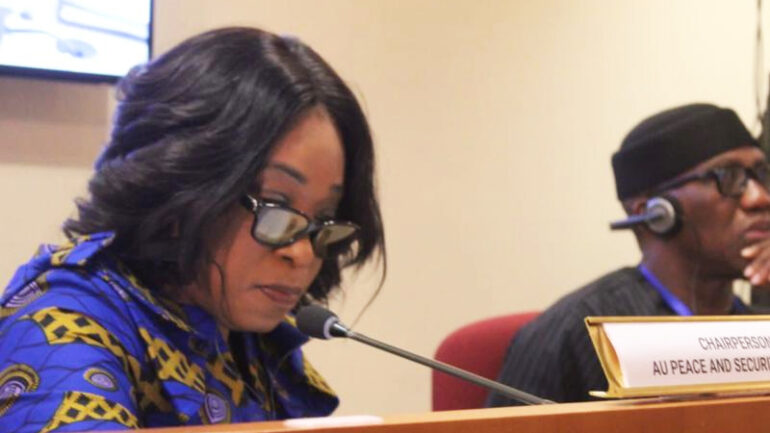The AU PSC Ministerial Meeting on Strengthening Regional Organizations

- Posted by admin
- Posted in Statement & Remarks
Your Excellencies Ministers, Distinguished Members of the AU PSC,
Your Excellency, Moussa Faki Mahamet, Chairperson of the AU Commission,
Your Excellency, Amb. Bankole Adeoye, Commissioner for Political Affairs, Peace, and Security,
Your Excellency, Vladimir Voronkov, Under-Secretary-General, United Nations Office of Counter-Terrorism,
Your Excellency, Parfait Onanga-Anyanga, Special Representative of the Secretary-General to the African Union and Head of United Nations Office to the African Union (UNOAU),
Your Excellencies Representatives of the Regional Economic Communities and Regional Mechanisms
Excellencies,
Ladies and Gentlemen.
I am pleased to welcome you to this meeting of the Peace and Security Council of Africa Union (PSCAU) at the Ministerial level. Let me commend the PSC Secretariat and all stakeholders for facilitating the organization of our meeting.
Our Regional Economic Communities (RECs) and Regional Mechanisms (RMs) have emerged as the key players in responding to the terrorism and violent extremism that threaten all our countries. Strengthening their capacities is a reflection of our renewed determination to silence the guns and achieve the Africa We Want. We know, however, that to ensure a robust, well-resourced, and capable security architecture, we must end the increasing imbalance in the burden-sharing between us and the international community. Africa today carries the largest share of the international peace and security burden, which in fact should be a global responsibility.
It is obvious that unless we secure predictable sustainable financing for the peace continuum, including strengthening the capacity of our regional institutions for peace and security and continental integration and economic transformation, we shall continue to fall short in building inclusive and stable societies and preventing recruitment and radicalization. The fragility of our systems and the lack of resilience of our economies has been underscored by the impacts of COVID-19, the war in Ukraine and the worsening impacts of climate change.
As we take the lion’s share of responsibility for peace and security on our continent, through initiatives such as the 2020-2024 ECOWAS Action Plan for the Eradication of Terrorism in West Africa, the Accra Initiative, the Southern Africa Development Community (SADC) Mission in Mozambique, the Multinational Joint Task Force and the G5 Sahel, budgetary constraints have limited the ability of our regional organizations. Indeed, the prospects of success in taking on the terrorist menace, at the same time as we seek to recover from economic shocks and hardships among our populations, seem bleak. It is time to ensure that the United Nations, especially our development partners on the Security Council, respond with the commitments and support that are consistent with our ambitions and needs for peace and security and sustainable development.
Your Excellencies,
Resolution 1631(2005) of the United Nations Security Council recognised the increasingly important role that regional arrangements and organisations play in supplementing the efforts of the Council in the maintenance of international peace and security. Since then, the role of regional organisations in contributing to the maintenance of international peace and security has expanded greatly.
In this regard, there is the need to further strengthen cooperation between the Security Council and regional organisations. It is also necessary that we revisit the proposals for supporting RECs/RMs through funding from UN assessed contributions; and to provide logistical support to address conflicts and terrorism activities at the regional levels.
Our regional arrangements and organisations differ in mandate, structure, capacity, and experience in carrying out activities aimed at maintaining peace and security. We must, therefore, take into account their experiences and capacity to be able to gauge their capabilities as well as the support they would require in delivering on their mandates, in cooperation with the UN Security Council.
Consequently, it is my hope that our discussions today, will consider the increasing burden that regional organisations have assumed and examine their needs, both financial and logistical, to make them better equipped to deal with the challenges and threats on our continent today. Violent extremism, terrorism, large migration flows, inter-state territorial wars, intra-state civil strife, ethnic and social tensions, cyber-attacks, transnational crimes, and other evolving threats to global security require responses beyond the traditional approach of the United Nations Security Council. We must operationalise our Stand-By Forces, upgrade intelligence gathering and sharing, and ensure cooperation among RECs/RMs to promote comprehensive development across the regions to facilitate the integration and transformation agenda.
As a Council, it is our responsibility to encourage the international community to address the issue of burden-sharing. The responsibility our individual countries shoulder in fighting or preventing terrorism imposes undue financial challenges that undermine the systematic implementation of the 2030 Agenda for Sustainable Development, the very condition for sustaining peace and security.
Distinguished Colleague Ministers and your Excellencies,
l look forward to concrete outcomes during our deliberations that would contribute to both the process towards sustainable financing, led by the UN and AUC, as well as the work of the A3 in the United Nations Security Council.
I thank you for your attention.
